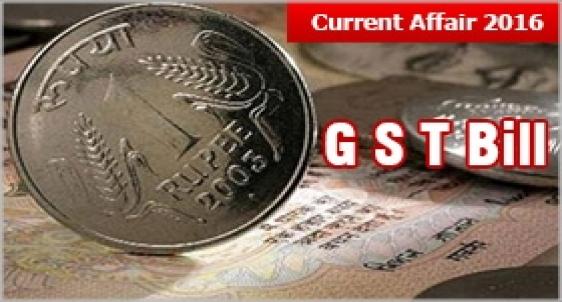
Debate on Goods and Service Tax (GST) Bill, one of the hottest topics in current affairs and a favourite source of GK questions in MBA and other entrance exams has already begun and the Parliament is all set to weigh various pros & cons before converting GST Bill into an Act.
Questions on GK or General Awareness form an important section with a weightage of 15 to 25% in almost all the national level MBA entrance tests including XAT, IIFT, SNAP. GK questions are also the source of discussion during GD, PI, WAT, Extempore topics for MBA admission in IIMs, FMS, MDI, SPJIMR, XLRI and other highly ranked institutes.
MBAUniverse.com has begun with a unique initiative of publishing a series of current GK topics to benefit the MBA aspirants to know more about the current national and global environment that become the source of GK questions. The first in the series is GST Bill.
GST, one of the biggest taxation reforms in India is a comprehensive tax levy on manufacture, sale and consumption of goods and services at a national level. A right step to move forward with the ‘Make in India’ vision implementation of GST will get rid of multi tier and multiple taxation system in the country.
The bill was tabled in Parliament in 2014 by the newly elected BJP Government. However, the main opposition party Congress as well as other opposition parties in Rajya Sabha, the upper house of Parliament - wanted certain modifications to be carried out before agreeing to the passing of GST Bill 2014. It now appears that the GST Bill might get safe passage as the Congress has agreed to a debate on the bill and other political parties also show inclination to support the GST bill.
What is GST Bill?
The Goods and Services Tax Bill or GST Bill, officially known as The Constitution (122nd Amendment) Bill, 2014, proposes a national Value Added Tax to be implemented in India. GST stands for "Goods and Services Tax", and will replace all indirect taxes levied on goods and services by the Indian Central and State governments. It is aimed at being comprehensive for most goods and services
GST-History
In 2000, the Vajpayee Government set up an Empowered Committee of State Finance Ministers headed by Asim Dasgupta, Minister of Finance and Excise of West Bengal to frame the model of Value Added Tax (VAT). The aim was to do away with the existing national-level central excise duty and state-level sales tax.
When UPA Government came to power, an announcement was made by the then Union Finance Minister Mr. P. Chidambaram during the budget session of 2006-07 on February 28, 2006, that GST would be introduced from April 1, 2010. The salient features about this legislation were first time discussed in its first discussion paper in year 2009. But the GST Bill remained in abeyance for one or other reason till it was re-introduced in 2014 by Modi Government with a new draft proposal.
Why the GST bill remains stalled?
Opposition has been asking for following 3 important amendments to be carried out in GST bill
-- Congress party has demanded an upper limit of 18% on GST which should be listed in the constitutional amendment.
-- It also demands that the proposed 1% state levy should be removed
-- There must be a powerful council to settle disputes on revenue-sharing between states.
GST Bill: Key points affecting common life
Destination based Indirect Tax GST would be a destination based tax as against the present concept of origin based tax. It is going to replace all indirect taxes levied on goods and services by the Indian Central and State governments.
Single Taxation: No multiplicity
As multiple taxes on a product or service are eliminated and a single tax comes into place, the tax structure is expected to be much simpler and easier to understand. Flow of goods would be much smoother as the transporting of goods would be possible without interruption from place of origin to place of destination.
Win-Win situation for Centre, State and Goods & Service Industry
GST Bill would replace the taxes collected by Central Government on Goods and Services such as Central Excise duty, Duties of Excise (Medicinal and Toilet Preparations), Additional Duties of Excise (Goods of Special Importance), Additional Duties of Excise (Textiles and Textile Products), Additional Duties of Customs (commonly known as CVD), Special Additional Duty of Customs (SAD), Service Tax, Cesses and surcharges.
On the sides of the States, GST would replace State VAT, Central Sales Tax, Luxury Tax, Entry Tax (other than those in lieu of Octroi, Entertainment Tax, Taxes on advertisements, Taxes on lotteries, betting and gambling , State cesses and surcharges in so far as they relate to supply of goods or services
Will simplify taxation
The implication of GST bill assures a single taxation system in the entire country for all goods and services making tax compliance easier and more effective. This will simplify India's tax structure, broaden the tax base, increase the revenue and create a common market across states. According to a report by the National Council of Applied Economic Research, GST is expected to increase economic growth by between 0.9 per cent and 1.7 per cent.
Beneficial to all
Corporate and manufacturing sectors will get following benefits with the implementation of GST bill-
-Average tax burden on companies will fall
-Reducing production costs will make exporters more competitive
-The reduced cost of locally manufactured goods and services will increase the competitiveness of Indian goods and services in the international market and give boost to Indian exports.
-Manufacturing sector in India is one of the highly taxed sectors in the world. GST bill when enforced would eliminate complexities in the present taxation structure and consequently prevent the loss of nearly 50% of the advantage of lower manufacturing costs that India has over the western nations.
-The individual will benefit from lowered prices in the process which will subsequently lead to increase in consumption thereby profiting companies.
Can GST bill become Act now?
The chances are more as the Government appears to be in mood to accept most of the amendment demand from opposition in GST bill proposal. The only stranglehold according to the Government is that it is not advisable to list the cap of 18% in constitution as specifying a tax rate in the constitutional amendment would require amending the constitution every time when the rate is changed.
Emerging GK questions from the text
-- What does GST stand for?
-- When GST was conceptualized?
-- GST Bill when passed by Parliament will be a direct tax or indirect tax?
-- Tax levied under GST would be origin or destination based?
-- Who headed the empowered committee on GST when the idea was first mooted?
-- GST Bill when passed will be a multiple taxation or single taxation?
Stay tuned to MBAUniverse.com for more GK topics on current affairs



























